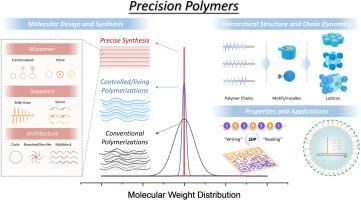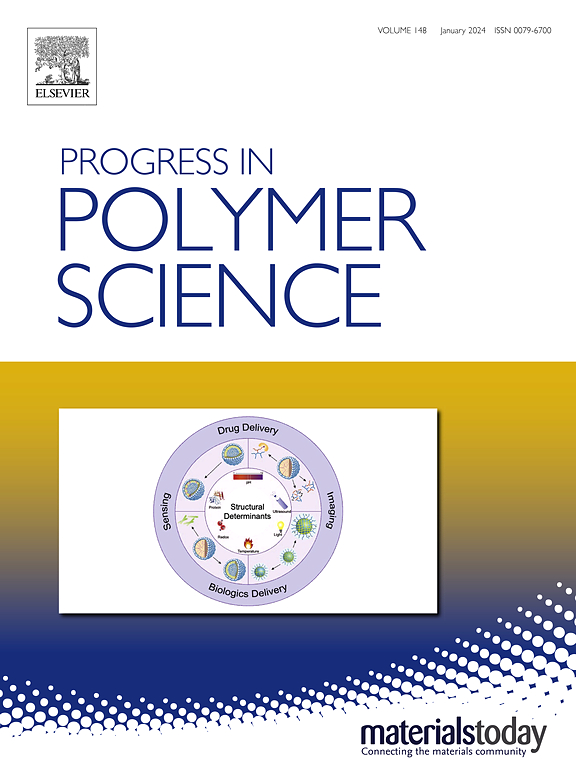Precision Polymers: Advances in Synthesis, Structural Engineering, and Functional Optimization
IF 26.1
1区 化学
Q1 POLYMER SCIENCE
引用次数: 0
Abstract
Most synthetic polymers are mixtures of homologous chains that vary in chain length, sequence, and architecture. This inherent heterogeneity blurs fundamental structure-property correlations and compromises experimental resolution, reliability, and reproducibility. Although modern polymerization techniques have achieved remarkable control over molecular parameters, absolute structural uniformity across multi-length scales remains unattainable. Recent progress in iterative synthesis and high-resolution chromatography has facilitated the creation of precision polymers—chains of uniform length, exact sequence, and programmable architecture. This review summarizes recent advances that confer such structural fidelity, focusing on iterative synthetic strategies and chromatographic separations. We further illustrate how these precisely defined molecular parameters translate into quantitatively predictable thermodynamic and kinetic behaviors, exemplified by crystallization and self-assembly in bulk and solution. Emerging applications in electronic information, biomedical engineering, and organic optoelectronics are also outlined. We conclude by assessing the remaining challenges and opportunities presented by the advent of AI-guided design and automation.

精密聚合物:合成、结构工程和功能优化方面的进展
大多数合成聚合物是同源链的混合物,其链长、序列和结构各不相同。这种固有的异质性模糊了基本的结构-性质相关性,并损害了实验的分辨率、可靠性和可重复性。尽管现代聚合技术已经实现了对分子参数的显著控制,但在多长度尺度上的绝对结构均匀性仍然是不可能实现的。迭代合成和高分辨率色谱的最新进展促进了精确聚合物链的创建,这些聚合物链具有均匀的长度、精确的序列和可编程的结构。本文综述了赋予这种结构保真度的最新进展,重点是迭代合成策略和色谱分离。我们进一步说明了这些精确定义的分子参数如何转化为定量可预测的热力学和动力学行为,例如在体和溶液中的结晶和自组装。本文还概述了电子信息、生物医学工程和有机光电子学等领域的新兴应用。最后,我们评估了人工智能引导的设计和自动化出现所带来的挑战和机遇。
本文章由计算机程序翻译,如有差异,请以英文原文为准。
求助全文
约1分钟内获得全文
求助全文
来源期刊

Progress in Polymer Science
化学-高分子科学
CiteScore
48.70
自引率
1.10%
发文量
54
审稿时长
38 days
期刊介绍:
Progress in Polymer Science is a journal that publishes state-of-the-art overview articles in the field of polymer science and engineering. These articles are written by internationally recognized authorities in the discipline, making it a valuable resource for staying up-to-date with the latest developments in this rapidly growing field.
The journal serves as a link between original articles, innovations published in patents, and the most current knowledge of technology. It covers a wide range of topics within the traditional fields of polymer science, including chemistry, physics, and engineering involving polymers. Additionally, it explores interdisciplinary developing fields such as functional and specialty polymers, biomaterials, polymers in drug delivery, polymers in electronic applications, composites, conducting polymers, liquid crystalline materials, and the interphases between polymers and ceramics. The journal also highlights new fabrication techniques that are making significant contributions to the field.
The subject areas covered by Progress in Polymer Science include biomaterials, materials chemistry, organic chemistry, polymers and plastics, surfaces, coatings and films, and nanotechnology. The journal is indexed and abstracted in various databases, including Materials Science Citation Index, Chemical Abstracts, Engineering Index, Current Contents, FIZ Karlsruhe, Scopus, and INSPEC.
 求助内容:
求助内容: 应助结果提醒方式:
应助结果提醒方式:


